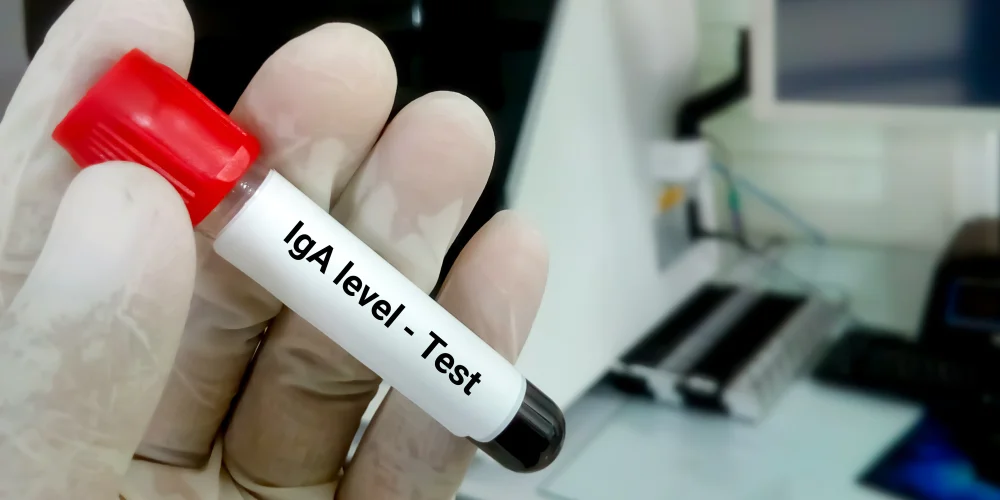Serum IgA Test
Immune System Function and Mucosal Immunity
It is the S.IGA Test is a crucial diagnostic test that measures the amount of Immunoglobulin A (IgA) in blood. IgA is an important antibody that is involved in mucosal immunity that is found in various fluids such as tears, saliva and mucus. It is a crucial factor in protecting the respiratory and digestive tracts from infection. By measuring IgA levels it provides crucial insight into the immune system’s response to illness to help diagnose and treat various immune-related conditions and disorders. Atypical or low IgA levels could suggest conditions such as selective IgA deficiency, autoimmune disorders and chronic infections or digestive disorders This test is crucial for a thorough assessment of the immune system.

When is the S.IGA Test Prescribed?
It is the S. IgA Test is used in a variety of clinical situations:
- Diagnose of Immunodeficiency Disorders : To detect diseases such as Selective IgA Deficiency which means that the body does not have adequate quantities of IgA.
- Assessment of Autoimmune Diseases : To assist in the evaluation of autoimmune conditions like celiac disease and systemic lupus erythematosus (SLE), where IgA levels can be altered.
- Monitoring Chronic Infections : for patients suffering from chronic illnesses or with frequent illnesses, it is important to evaluate the immunity and efficacy of treatment.
- Assessing Gastrointestinal Disorders : To study diseases like IBD (IBD) and chronic digestive problems, as IgA levels may be a sign that the immune system of your mucosa is functioning.
Preparation for the S.IGA Test
A special preparation is not usually needed to take taking the S. IgA Test. Patients are able to take their food and drink as normal prior to the test. It is however crucial to inform your doctor about any supplements or medications you take, because they could influence the outcomes.
Parameters Considered During S.IGA Test
It is the S. IgA Test measures the amount in Immunoglobulin A present in serum. The most important measure refers to the serum IgA level, which aids in identifying any deficiencies, identifying abnormalities, and in assessing the general immunity. A low IgA levels could suggest an IgA deficiency, or a variety of other immune diseases, while higher levels may be related to chronic illnesses or autoimmune disorders. This test offers important information regarding the immune system of mucosa as well as the body’s response to different diseases.
Time Required for S.IGA Test Report
This S. IgA Test is simple procedure. Collection of blood samples is simple and not invasive. Results are typically accessible within a couple of hours to a full day, based on the processing time of the laboratory. This rapid turnaround is helpful in the prompt diagnosis and treatment of autoimmune disorders.
S.IGA Test Price
We offer S. IgA Test is priced at Rs 1100, making it an affordable option to evaluate the immune system’s function and diagnosing any immune-related illnesses. The affordable cost ensures access to diagnostics essential for providing timely and accurate health management.
Book an Appointment for S.IGA Test
Booking an appointment for the S. IgA Test at Chirayu Super Speciality Hospital is easy and simple. It is possible to book your test swiftly through our website that is user-friendly or call our customer service staff to get help. Our team is dedicated to providing timely and professional service that ensures a smooth and efficient test experience.
What Our Patients Say
Hear from our valued patients about their experiences at Chirayu Super Speciality Hospital and how our care has made a positive impact on their health and well-being.


Chirayu S. IgA Test service was affordable and accurate. The staff made the process seamless.


I’m grateful for the detailed explanation of my S. IgA Test results. Chirayu Hospital is top-notch.


Prompt results and courteous staff made my S. IgA Test experience smooth and stress-free.


The S. IgA Test helped diagnose my immune condition quickly. Excellent service and efficient processing.


I appreciated the clarity of the S. IgA Test results and the support from the hospital staff.


The S. IgA Test at Chirayu Hospital was quick and professional. Results were accurate and timely.
Frequently Asked Questions
Here, we provide answers to some of the most commonly asked questions to help you better understand our services, policies, and facilities. If you have any additional questions, please do not hesitate to contact us.
The S. IgA Test measures Immunoglobulin A levels to assess immune function and diagnose immune disorders.
No special preparation is required. You can eat and drink normally before the test.
A blood sample is collected from a vein in your arm, which is then analyzed for IgA levels.
Low levels may suggest an IgA deficiency or other immune system disorders.
Results are typically available within a few hours to one day, depending on the lab’s processing time.